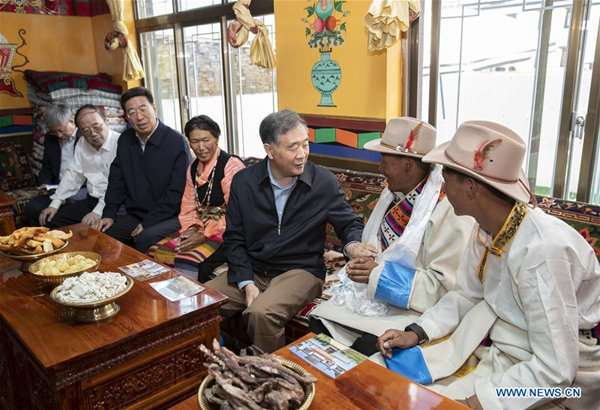Wang Yang stresses consolidation of Tibet's enduring peace, stability

Wang Yang, a member of the Standing Committee of the Political Bureau of the Communist Party of China Central Committee and chairman of the Chinese People's Political Consultative Conference National Committee, talks with local residents at a village relocated for poverty relief in Xigaze, southwest China's Tibet Autonomous Region, July 6, 2020. Wang made a three-day inspection tour that started on July 6 in the region. (Xinhua/Huang Jingwen)
LHASA -- Wang Yang has stressed continuous efforts to consolidate the foundations of enduring peace and stability in southwest China's Tibet Autonomous Region.
The efforts should center on safeguarding the country's unity and strengthening ethnic solidarity, resolutely combating separatism, forestalling and defusing major risks and challenges and continuously consolidate the foundations of long-term peace and stability in Tibet.
Wang, a member of the Standing Committee of the Political Bureau of the Communist Party of China Central Committee and chairman of the Chinese People's Political Consultative Conference National Committee, made the remarks during an inspection tour in the region.
During the three-day tour that started on July 6, he visited villages relocated for poverty relief, pasturing areas, industrial parks and religious venues in Xigaze and Lhasa, and presided over a symposium where he listened to suggestions from the attendees.
Speaking highly of the efforts made by the region's Party committee in recent years, Wang noted that the work related to ethnic and religious affairs concerns the enduring peace and stability of the region, asking for further research into the history of the community of the Chinese nation to improve public awareness of ethnic unity and progress.
He called for raising the social awareness of religious believers that they are, above all, citizens of the country, as well as the promotion of patriotism to further adapt Tibetan Buddhism to the socialist society.
Highlighting a people-centered development vision, Wang stressed that poverty alleviation is both an economic and a political task, and urged efforts to make sure nobody from any ethnic group in Tibet lags behind in marching into a moderately prosperous society.
He also underscored the role of the rural vitalization strategy, education and characteristic industries in poverty alleviation in the region.
Copyright © The National Committee of the Chinese People's Political Consultative Conference.
All rights reserved. Presented by China Daily.
京ICP备08100501号-1

